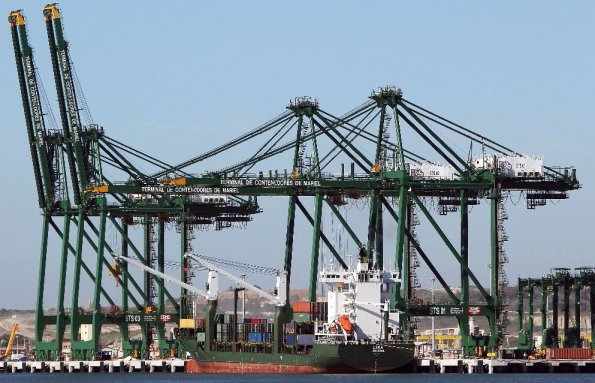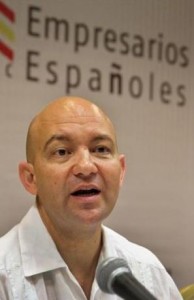
Spain will open a $45.37 million credit line for its companies in Cuba
The Spanish Development Finance Institution (COFIDES) will open a 40-million-euro line of credit for Spanish firms doing businesses in Cuba. The line, to be known as the Cuba Funding Line, will be available until 2017 and can be increased.
The announcement was made Monday (June 22) in Madrid by the president of COFIDES, Salvador Marín; Spain’s secretary of state for Trade, Jaime García-Legaz, and the vice president of the Spanish Federation of Business Organizations (CEOE), Joaquím Gay de Montellá. (The photo above shows them, from left to right.)
Marín told the press that the credit line was created “as a result of the opening to the outside that Cuba is experiencing, the incentives to foreign investment that [Cuba] will offer, and the interest shown by Spanish business companies.”
According to a COFIDES press release, the Cuba Line will underwrite the projects of large, medium and small Spanish businesses. The starting fund will contain 40 million euros ($45.37 million) but can be increased “depending on the needs of the Spanish businesses.”
Part of the credit line — from 75,000 euros to 30 million euros ($85,090 to $34.1 million) — will be made available long-term to productive and commercial companies (up to 12 years for productive businesses and 3 years to commercial businesses, with allowable delinquency periods of 4 years and 6 months, respectively.)

Another portion of the credit line — from 75,000 euros to 2 million euros ($85,090 to $2.27 million) — is devoted to projects in the Mariel Special Development Zone. Payment will be due in 3 years, with an allowable delinquency period of up to 6 months.
The projects applying for credit must submit “sufficient guarantees and must have a positive impact in the country.”
The Spanish news agency EFE quoted Marín as saying that most of the projects will require an average investment of 3 million or 4 million euros ($3.4 million or $4.54 million.)
“For every euro of public money invested, up to 9 euros can be raised [in private co-financing],” he told EFE, so the credit line “could mean 400 million euros [$453.8 million] in investments for the Spanish businesses in Cuba.”

Trade Secretary Jaime García-Legaz will be in Cuba July 6-7 at the head of a delegation of business executives selected by the CEOE and the Chamber of Commerce of Spain “to analyze in greater depth the opportunities for business in the region,” Gay de Montellá said.
The CEOE president praised the opportunities offered by the Mariel Zone, calling it “an authentic focus for investments, with major advancements in innovation and logistics. The Zone also offers a series of special policies to attract foreign investment,” he said.
García-Legaz explained that the new credit line will allow Spanish companies to invest in diverse projects in Cuba. The tourism industry will be favored in terms of construction, services and transportation. Renewable energy projects will also benefit from the available loans.
The secretary of Trade pointed to Cuba’s new law on foreign investment, which “guarantees the repatriation of profits to Spain, opens practically all sectors with a possibility of participation of up to 100 percent and grants tax incentives.”
García-Legaz visited Cuba in mid-April and said later that Cuba’s removal from the U.S. list of countries that sponsor terrorism “places Spain in a situation in which we feel — and the [business] companies have let us know — that we must begin a phase of much greater intensity.”
Cuba was removed from that list on May 29.

